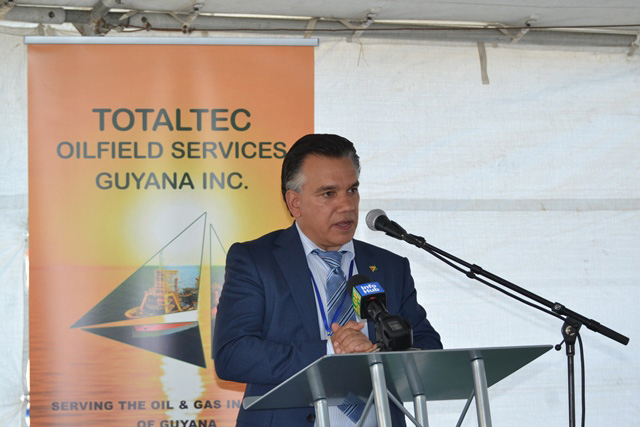While the COVID-19 pandemic has affected their operations, local oil and gas support companies Ramps Logistics and TOTALTEC Oilfield Services have so far committed to retaining staff and have implemented measures to ensure everyone is paid as they abide by public health measures instituted to prevent the spread of the virus.
“At Ramps, we haven’t laid off anybody. That is not even something we are looking at because we are trying to find ways to accommodate them as they work from home,” Business Development Director Mariska Jordan told Stabroek News.
“We have the majority of the staff working from home. We have given them laptops, given them internet, because some people they didn’t have, and we had to make sure they did, equipped them with safety stuff, such as sanitizers and PPE, but we are not looking at lay-offs,” Jordan added.

Chief Executive Officer (CEO) Lars Mangal said that while all staff of TOTALTEC are being paid, “some are being paid to varying extents.”
“It depends on what they are doing. We have done our best to try and retain everyone. We have retained everyone [so] that they can sustain themselves during the period of the lockdown,” he said.
“We have been impacted like everybody else and limited operations to essential operations— only [ones] that are urgent, pressing or have to be addressed,” he added.
According to local industry oil and gas support services expert Richard De Nobrega, the work schedules of offshore support workers will be affected as foreign crew members were out of the country when the ports were closed.
He also said that some foreign crew members would have also opted to stay with their families in their home countries during this period.
“From my analysis, I think that it really started when the borders started shutting down and that affected crew changes. A lot of the work force came from overseas and you also had a safety concern that people are allowed only a certain number of days offshore. So I think Guyana would have seen a reduction in crew changes in operations,” he explained.
While mining and offshore rig work have been deemed essential services and have been given the go ahead to continue once in accordance with COVID-19 measures, including social distancing, De Nobrega said that all industries will feel the impact since it is global.
“The global supply chain is being slowed although there is no significant cease in operations. There is no effect on cargo flights but you do see a reduction on the amount of packages being brought in,” he said.
However, he argued that Guyana will not face as severe an impact as other countries, since current oil majors here have excluded Guyana from all of their global cuts.
“At least for 2020, we might not feel the impact as severe because the big companies have cut their budgets but Guyana has been spared. There is talk about the breakeven price here and all of that but the cost of production is still less and even now our oil is still attracting a significant price,” he said.
But support services workers, according to him, will have to adjust their schedules to meet the demands of their clients, while ensuring the safety of their employees and following stipulated guidelines until normalcy is restored.
ExxonMobil has already said that its offshore workers are placed at a private city observation facility, and must undergo a 14-day observation period before they are allowed to go aboard its offshore facilities, as part of its rigid safety measures against COVID-19.
“Rotational workers are being staged at this temporary facility to ensure that they are healthy and virus-free before and after they go offshore,” the company’s Public and Government Affairs Advisor Janelle Persaud explained when contacted.
“…We also want to play our part to help stop the spread of the virus here in Guyana,” she added.
As it pertains to the workers who are pre-screened and observed before going offshore, Persaud said that during this period workers are considered to be on duty and are thus paid.
Earlier this month, she had said that safety measures were implemented for workers heading to Exxon’s vessels in the offshore Stabroek Block, even as it continues to monitor global low oil prices and the possible effects on the company.
“ExxonMobil Guyana is working to limit the disruption of the coronavirus to our operations… offshore workers are being screened at the Ogle heliport before they are cleared to travel offshore to ensure they are not exhibiting symptoms of the virus and that they have not knowingly come in contact with anyone who has the virus,” she had said.
In addition, Persaud said there are medical personnel onboard all of the company’s offshore facilities and they are “taking necessary precautions to monitor the health of the workers and provide appropriate treatment and care.”
Both Ramps and TOTALTEC emphasised safety, with Jordan explaining that her company holds continuous training sessions for employees.
Jordan said that her company handles cargo and other clearance operations and port and other staff are trained in collecting and sanitising receivables and how to interact with the public, should they ever have to. “We equip our staff with safety gear and sanitizers and they are trained, from dealing with people to handling packages and washing hands,” she explained.






